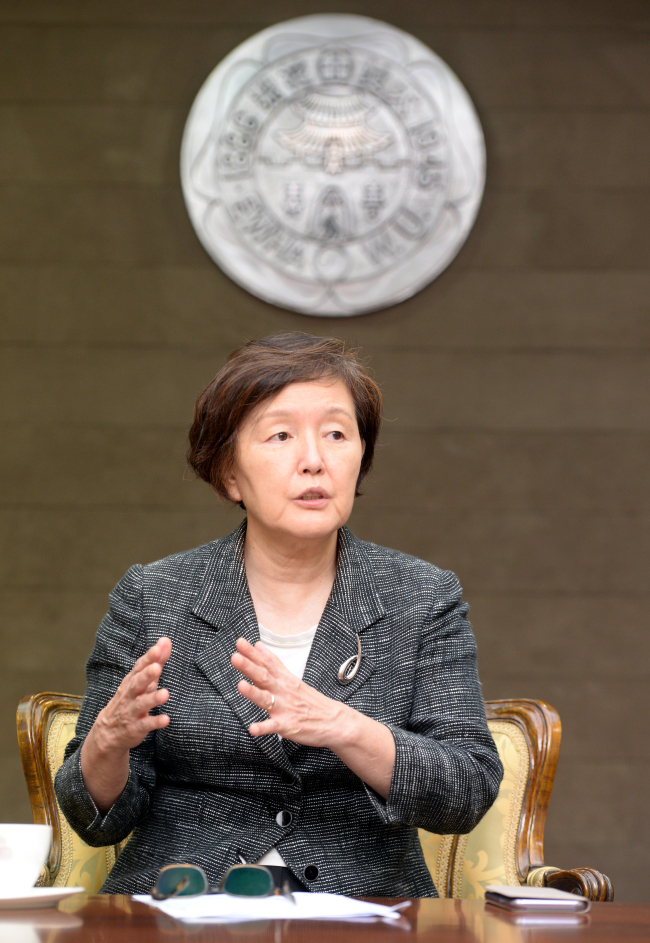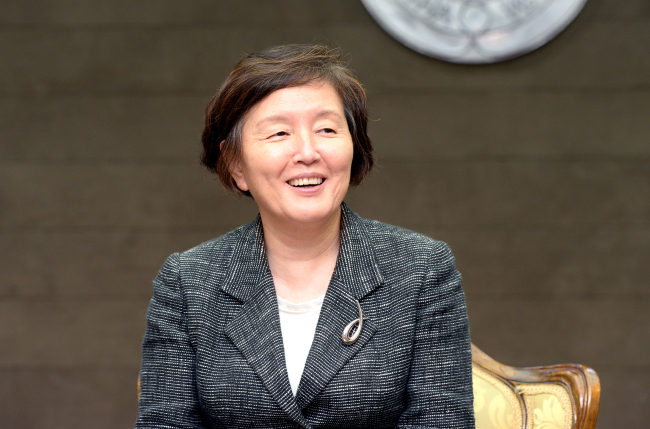In South Korea, women earn less than men. Traditional gender norms still hold sway in many sectors of the Confucian society. The country has the largest gender wage gap amongst the world’s developed countries, while women still remain a rare species in corporate Korea’s C-suite.
But for Kim Hei-sook, head of the elite Ewha Womans University, women’s distinct sensibility and empathy which enable them to better connect with people, will be a valuable asset in the new age of the “fourth industrial revolution.”
 |
Kim Hei-sook, Ewha Womans University president (photo: Park Hyun-koo/The Korea Herald) |
“After decades of struggle, women have finally become independent and socially autonomous like men (in South Korea,) but they are now still struggling to reach the positions to shape the social and political landscape,” Kim said in an interview at the university’s campus in Seoul.
But as technology changes, so do gender roles. The coming major wave of socioeconomic transformation will bring to women opportunities that were not seen before, she said.
Traditional engineering skills alone -- typically dominated by men -- will not be enough to cope with the unknown challenges lying ahead, she went on, stressing the need to tap into the female talent pool.
“Creative thinking will become ever more important.”
Still, there are so few women in the field of emerging technologies, like 3-D printing and robotics, Kim noted.
 |
(photo: Park Hyun-koo/The Korea Herald) |
As an educator, she wants to better prepare female students for the forthcoming era.
“The key is to leverage the collective power of female intellectuals here at Ewha and develop and learn strategies to use digital tools from our own perspectives. Now with a new era of artificial intelligence dawning upon us, women should be able to equip themselves with the right skills so that we can take on new, emerging jobs.”
To achieve that, the leading women’s university here has rebranded its engineering college into ELTEC College of Engineering, which comprises some of the most advanced engineering education in technology including mechanical, biomedical and materials science.
It was the world’s first women’s college of engineering when it was established in 1996, with the aim of meeting the country’s needs for female engineers.
As the new name represents -- which stands for excellence, leadership, technology, entrepreneurship and convergence -- 550 female students who have entered this year are learning the convergence of diverse engineering knowledge and its application through business management techniques.
In the global manufacturing sector, workers, whether white or blue-collar, are already at risk of being replaced by robots.
But the robots will not be able to perform tasks on the level humans can in certain areas where a focus on humans is more needed.
“The AI technology has not yet reached this level, in particular, when it comes to responding to our certain emotions. In that regard, women have the edge when equipped with the right skills,” said Kim.
She questioned: “Why are there so few girls here playing video games like many other men do?”
The needs to obtain the right skills, of course, come from a sense of urgency and a desire among themselves to do something outside of their traditional boundaries, Kim said.
Originally a philosophy professor, Kim took office as president of Ewha on May 26, as the university’s first president elected through a direct vote of the faculty, administrative staff, students and alumni since its establishment.
Her election was widely seen as a closure to one of the most turbulent periods of Ewha’s 131-year of history: Ewha was embroiled in a massive scandal surrounding former President Park Geun-hye’s close friend Choi Soon-sil, accused of providing favors to Choi’s daughter in admissions, grades and school affairs.
For Kim, that was a case where political power and educators colluded immorally -- not something that frequently happened in the past.
Ewha’s former president Choi Kyung-hee stepped down in October last year amid allegations that she gave admission favors to Chung Yoo-ra, the daughter of former President Park’s longtime friend and confidante.
The admission fraud was part of a sweeping corruption scandal surrounding Park which eventually led to her impeachment and the arrest of the school’s several top officials, including Kim’s predecessor.
Kim was at the front of the professors’ protests against the irregularities of the school’s leadership then led by Choi. But in person she was soft-spoken and composed.
“There are two sides on the admission fraud scandal. First is, we should bring positive images back again as a leading educational institution, which won’t be easy. Another is that our students have proved themselves to be brave enough to fight for justice,” Kim said.
She vowed open communication and inclusive leadership, seeking to rebuild the elite school after months of internal and external troubles.
Kim said opposite views and conflicts are natural in human society, addressing the importance of cooperation and dialogue.
“Most importantly, we need to regain trust within our community first, settling conflicts through dialogue and democratic procedures,” Kim added.
By Bak Se-hwan (
sh@heraldcorp.com)









